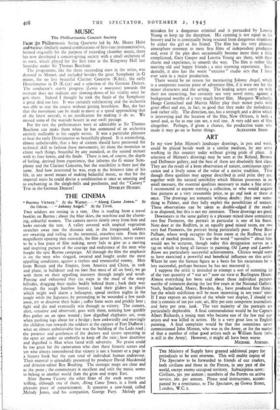THE CINEMA "Burma Victory." At the Warner.—" Along Came Jones."
At the Odeon.—" Johnny Angel." At the Tivoli.
Two soldiers are resting in a tent. One is reading from a travel booklet on Burma ; about the blue skies, the sunshine and the charm- ing, colourful women. The camera moves slowly away from him and . looks outside the tent. A valley covered with tropical vegetation stretches away into the distance and, in the foreground, soldiers are sweating and toiling in the torrential, ceaseless rain. From this magnificent opening shot onwards, the film never falters, never ceases to be a fine piece of film making, never fails to give us a moving and inspiring picture of the courage and endurance of the men who fought the epic Burma campaign. All through the film the emphasis is on the men who slogged, sweated and fought under the most appalling conditions, against a tireless and resourceful enemy. Men from Britain and the Empire, from America and China, in tank and plane, in bulldozer and on foot (but most of all on foot), we go with them on their appalling journeys through jungle and scrub. Panting and exhausted they cut steps in the mud of the steep hillsides, dragging their mules bodily behind them ; hack their way through the tough bamboo forests ; land their gliders in places which might well alarm a helicopter, spend restless nights in the jungle while the Japanese, by pretending to be wounded a few yards away, try to discover their hides ; suffer from sores and prickly heat ; fight and die and eventually win through to victory. The camera, alert, sensitive and observant, goes with them, noticing how quickly flies gather on an open wound ' • how dignified elephants are, even when pushing logs about for a bridge ; how awkwardly and movingly the children run towards the soldiers at the capture of Fort Dufferin ; what an almost unbelievable feat was the building of the Ledo road ; the patience and gentleness of the doctors and sisters operating in the open air under an umbrella to keep off the rain • how dauntless and dignified is Man when faced with adversity. No praise could be too great for the cameramen who shot these historic scenes and yet who always remembered that victory is not a banner or a page in a history book but the sum total of individual human endeavour. Their material is splendidly presented by producer David Macdonald and director-editor Roy Boulting. The strategic maps are clear and to the point ' • the commentary is excellent and only the music scans to belong to another world than the grim and tropic East.
After Burma Victory the other films of the week seem rather trifling, although one of than, Along Came Jones, is a fresh and pleasant piece of entertainment. It concerns a cow-hand, called ,Melody Jones, and hts companion, George Fury. Melody gets mistaken for a dangerous criminal and is persuaded by Loretta Young to keep up the deception. His cunning is not equal to his bravery and he is continually being rescued from dangerous situations by either the girl or his friend. The film has the very pleasant atmosphere common to most first films of independent producers and, even if the plot does occasionally become more than a little complicated, Gary Cooper and Loretta Young are there, with their charm and experience, to smooth the way. The film is rather like meeting old and happy friends ; a nice warming experience. Inci- dentally, it also has the worst "exterior" studio sets that I have ever seen in a major production.
There would be no reason for mentioning Johnny Angel, which is a competent routine piece of adventure film, if it were not for the minor characters and the setting. The leading actors carry on with their not unexciting, but certainly not very novel story, against a background worthy of a very much better film. Margaret Wycherly, Hoagy Carmichael and Marvin Miller play their minor parts with great effect and are, in fact, so good that they make the melodrama look rather silly. The direction, too, has a strength and a drive which is interesting and the location of the film, New Orleans, is both a novel and, as far as one can see, a real one. A very odd sort of film altogether. Perhaps, if given a chance, the production team whc made it may go on to better things. ALEXANDER SHAW.






























 Previous page
Previous page